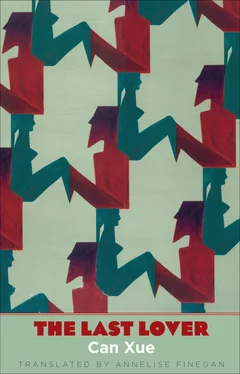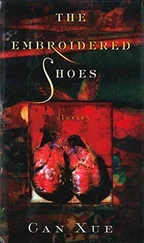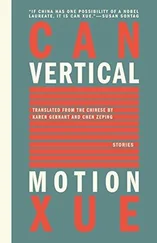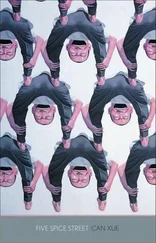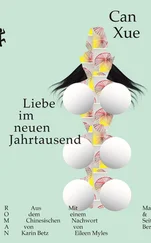Looking down from the balcony, Maria saw Daniel, covering half his face with a straw hat, brush past the woman’s body and run out. She could hear his elastic steps ringing on the road. The woman seemed to have no awareness of Daniel. She was there waiting for someone. Maria pitied her son. She shut the door leading to the balcony, drew the curtains, and stayed alone in the shadows thinking deeply. She wanted to whistle, and so she started to whistle, gently, a little like a cricket in the dark. Underfoot the mess of spread-out books started to shake their pages, becoming fan-shaped, but there was no wind in the house. Maria knew these were the original source of Joe’s square, from which his stories extended, becoming a limitless web of stories. Now he had abandoned all this and become the story himself.
In the electromagnetic field of the books Maria began to recollect her life with Joe. She remembered that Joe was afraid of her grandfather, even after Grandfather had been dead many years. Since the house had been built on an ancient foundation, her grandfather’s image occasionally appeared on the walls, most often at noon, when there was sun. Maria, in order not to frighten Joe, pretended not to see it, but she knew Joe saw. He didn’t dodge away, but rather stared intently at the wall. Maria understood that he longed for this kind of fear. In her adolescence, her grandfather always sat inside the house and seldom went out. One time Maria bolted in and saw Grandfather dancing to soft music, his legs, stiff from arthritis, now flexible. His arms spread wide, embracing an imagined woman. “Grandfather, who are you dancing with?” “With her,” he answered briefly, falling into an armchair in disappointment, painfully panting. Maria knew this “her” wasn’t her grandmother, because Grandmother didn’t dance. Of course it wasn’t some other woman either, because Grandfather never met women socially. Who was she then? For several decades Maria thought about this question. Now that Joe had left, Maria felt it had a prospect of solution. After her grandfather was buried she’d searched the house from top to bottom for that recording, but she could not find it. Perhaps there was no recording after all? That music? Was it no more than their hallucination?
Joe had heard the music when he arrived at her home. Grandfather seemed pleased with Joe, but he couldn’t say so. Instead he said he hoped Maria would stay away from this kind of man. Maria asked him why. He said there was no why. He also said he hoped she wouldn’t live at home after she married. “The origin of our family line is too ancient.” Young, energetic Maria didn’t understand what her grandfather was saying. And it wasn’t long before he passed away.
One night, when she and Joe were tired from lovemaking, she fell into a deep sleep. But at midnight she was roused by that music playing in the darkened house.
“Joe, are you dancing?” Maria felt suddenly confused and upset.
“No, I was watching, darling. Your family is so magical. I was wondering, am I your family’s lost son?”
So many years later, this “lost son” had left the home once again. At the moment Maria felt gratified and a little worried. After all, she and Joe had never gone to such a place before. But she also reflected that earlier, before Joe had even arrived, she hadn’t known he existed. Maria stood up from among the books, the haze in her heart dispersing little by little. It was almost as if she really had returned to former days.
“Oh, sir, you came so soon. We’ve had no time free the past few days.” A young boy wearing a long gown walked from the interior of the shop over to where Joe stood, sizing him up from head to toe.
Joe’s surprise can be imagined: he spoke the language of Joe’s country.
The boy started to laugh, and led him toward the interior, saying: “My father is one of your people. He always talks with me about your affairs. Father is very lonely.”
In the back there was an enormous, dark room. The boy lit a small oil lamp. Joe saw a spacious carved bed hung with linen mosquito netting. Someone apparently lay inside the netting. In a soft voice Joe asked the boy whether it was his father in there. The boy stuck closely to Joe, his nude back rubbing against him, as if he were afraid of something.
“No, my father is here, look!”
He pulled Joe over to the table and uncovered the lid of a bronze incense burner, scooping the bone ashes inside with his small hands.
“My father’s name is Kim. He lived over where you come from, and I grew up there. This year I’m thirteen years old.”
“He owns the pastureland?”
“Yes, I brought Father back by myself,” he said proudly. “He always says the bosom of the snowy mountains is his home. I never met someone who thought of home so much. Do you want to listen to him speak?”
Joe put his ear to the bronze censer, but what he heard was only the moan of the man inside the netting.
The boy waved the censer. The moans of the man inside the netting were worse. The more the boy shook the incense burner, the fiercer the moans. Bone ashes spilled out of the censer. Joe asked the boy who was inside the mosquito net. He said it was a passerby who’d walked in and gotten inside the netting.
“Sir, can you help me?”
“Help you do what?”
“There’s a large oven over there. It’s lit. Hold onto me, throw me into the oven, and wait until I’ve turned to ashes. Then you can scoop me out and put me into the censer.”
He led Joe to a door and kicked it open. Joe saw a blazing coal fire. A wave of heat attacked him and he drew back. The boy laughed piercingly.
“Coward, coward. Here, drink some of this scented tea.”
He gave Joe an enormous cup. Joe drank a mouthful and was choked so fiercely he couldn’t stop coughing. It felt as if his throat were being cut apart by knives. With difficulty he finally controlled the cough. Insane ideas sprang up in his mind.
“If you don’t drink the tea, how will you climb the snow-covered mountain?” The boy put on the manner of an adult, his voice becoming melancholy. “I will go into the furnace anyway. But I worry about you, what you will do alone.”
Joe didn’t dare open his mouth. He thought that if he opened it blood would come out. His mouth was already filled with the taste of blood. The man inside the netting grew enraged and began to curse and roar. The boy wanted Joe to go outside. He said it wasn’t safe in the room, and since Joe couldn’t help him he would finish the task himself. He wanted Joe to go through the door and walk always toward the east, because “underneath the sun nothing can go wrong.” When Joe passed by the large bed he smelled a strange fragrance, and another like the smell of a forest. His steps drew to a stop as if pulled by magnets and he stood still. “I didn’t think you were interested in this,” the boy said. He urged him to look inside the netting. Joe raised the netting, and the smell of mushrooms, of pine needles and of spring water blew against his face. A man lay inside the mosquito netting, or, more precisely, half of a man.
He was naked, with a seam dividing the center of his body. The left side was a normal man’s body; the entire right side was rotting, the skin turned to a blackish-green with spots on it, and with mold growing on the spots. His enormous penis was erect. It was especially offensive to look at — one side black, one side red, on the scrotum where the testicle should be was a festering hole. He stared at Joe, not feeling the slightest shame at his nakedness. Joe heard him say several sentences — perhaps it was the local language, he didn’t understand it. The boy crawled onto the bed, and he said in Joe’s ear, “This year he is 103 years old. He isn’t a passerby, he is the spirit of the earth for this region. His power is great.”
Читать дальше
